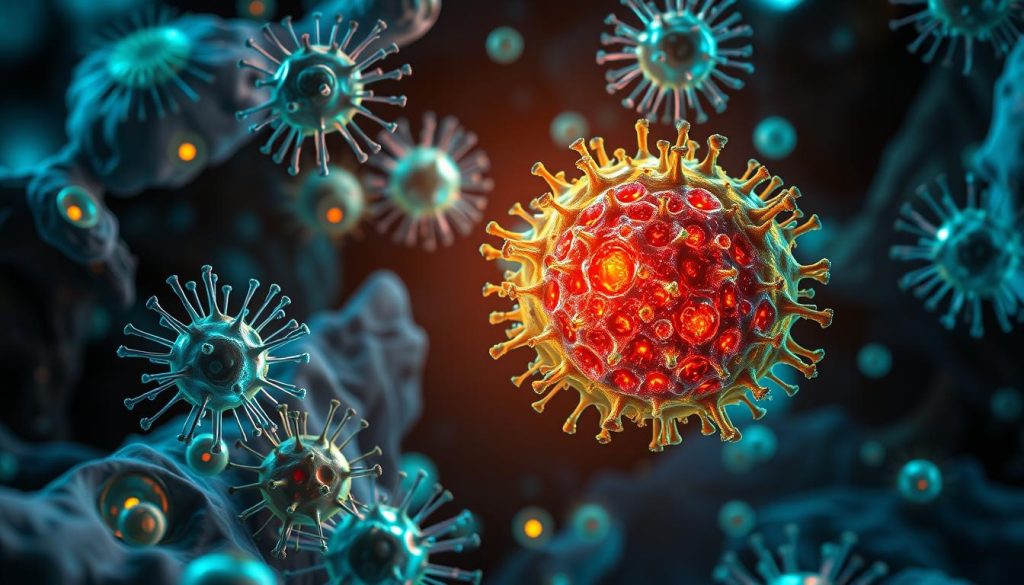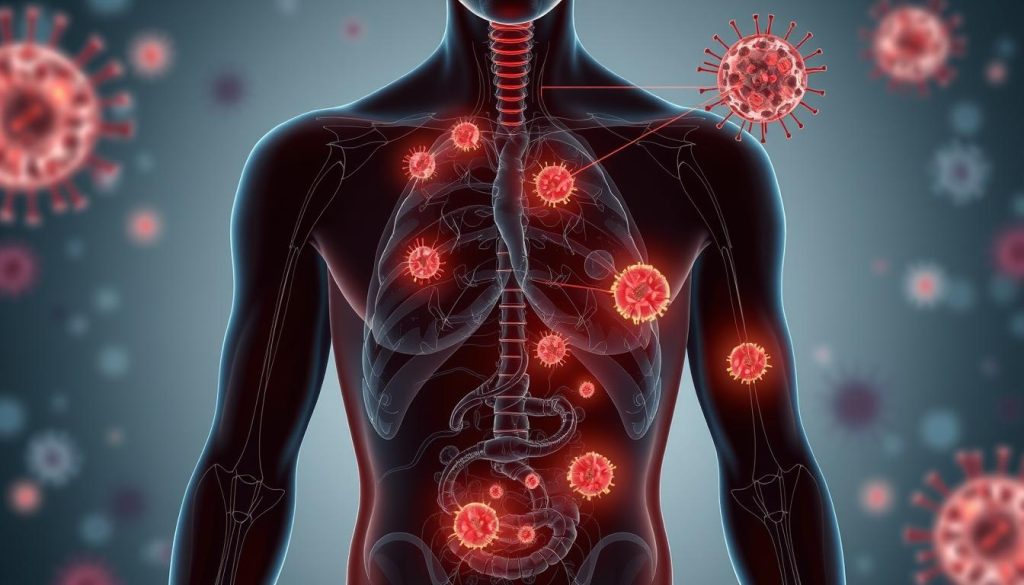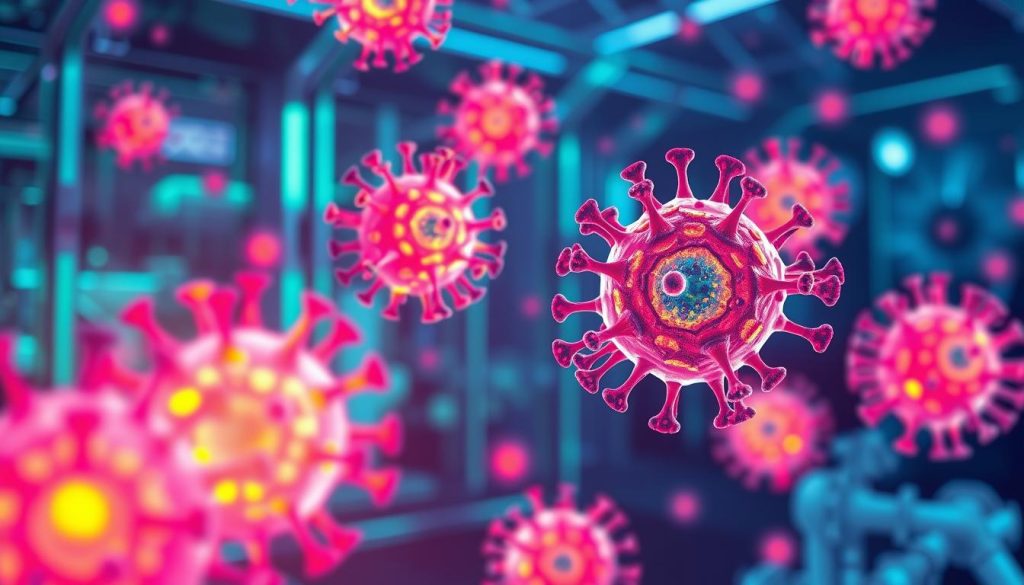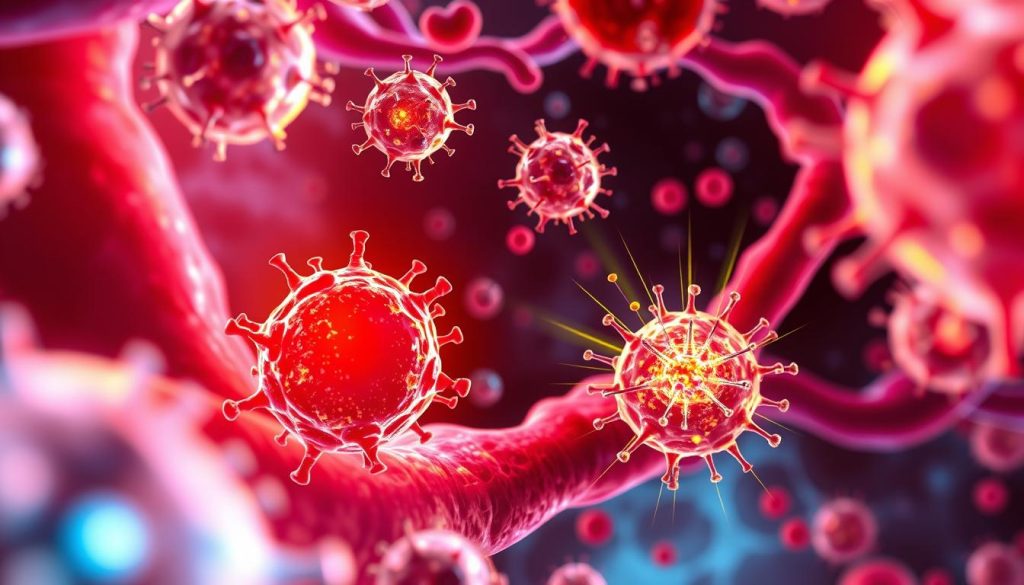A new hope in the fight against cancer is CAR T-cell therapy. It uses the body’s immune system to target cancer cells. This makes it a personalized way to treat cancer.
This therapy changes a patient’s T-cells to find and destroy cancer cells. It’s a big step in cancer treatment. It works well for some blood cancers and might help with solid tumors too.
As scientists learn more, CAR T-cell therapy could change cancer treatment forever. It offers hope to those who have tried everything else. Let’s dive into how CAR T-cell therapy is shaping the future of cancer care.
Understanding CAR T-Cell Therapy
CAR T-cell therapy is a new way to fight cancer. It uses the body’s immune system to attack cancer cells. This method changes T-cells to better target and destroy cancer.
What is CAR T-Cell Therapy?
Chimeric antigen receptor (CAR) T-cell therapy uses T-cells to fight cancer. First, T-cells are taken from the patient’s blood. Then, they are changed in a lab to find and kill cancer cells.
The CARs on the T-cells help them find cancer cells. This way, they can tell the difference between healthy and cancerous cells. This helps protect normal tissues from damage.
How CAR T-Cell Therapy Works
The steps of CAR T-cell therapy are:
- T-cell collection: Blood is taken, and T-cells are separated.
- Genetic modification: T-cells are changed to have CARs that target cancer.
- T-cell expansion: The modified T-cells are grown in the lab.
- Infusion: The T-cells are put back into the patient’s blood.
- Monitoring: The patient is watched for side effects and how well the treatment works.
After being put back in the body, the CAR T-cells look for cancer cells. When they find them, they attack and kill the cancer cells.
| Step | Description |
|---|---|
| T-cell collection | Blood is drawn from the patient, and T-cells are separated from other blood components. |
| Genetic modification | The isolated T-cells are genetically engineered to express CARs that target specific cancer antigens. |
| T-cell expansion | The modified T-cells are multiplied in the laboratory to create a large number of CAR T-cells. |
| Infusion | The CAR T-cells are infused back into the patient’s bloodstream. |
| Monitoring | The patient is closely monitored for side effects and treatment response. |
CAR T-cells can keep fighting cancer for a long time. This makes it a hopeful treatment for some cancers.
The Development of CAR T-Cell Therapy
The journey of CAR T-cell therapy has been incredible, filled with groundbreaking research and key milestones. This oncologic immunotherapy started with scientists trying to use the immune system to fight cancer.

The idea of lymphocyte engineering was the start of CAR T-cell therapy. Scientists found that by changing T-cells, they could make them better at finding and attacking cancer. This discovery opened up new ways to treat cancer.
Early Research and Breakthroughs
In the early days, scientists worked hard to understand the immune system and how it could fight cancer. They made big discoveries, including:
- Discovering chimeric antigen receptors (CARs) to make T-cells target cancer
- Creating ways to genetically modify T-cells with CARs
- Showing in studies that CAR T-cells could kill cancer cells
Key Milestones in CAR T-Cell Therapy
The path from lab to clinic has seen many important moments:
| Year | Milestone |
|---|---|
| 2010 | First clinical trial of CAR T-cell therapy in patients with advanced lymphoma |
| 2017 | FDA approval of first CAR T-cell therapy (Kymriah) for certain types of leukemia |
| 2020 | Expansion of CAR T-cell therapy indications to include multiple myeloma |
“The development of CAR T-cell therapy represents a paradigm shift in cancer treatment, giving hope to patients who have tried everything else.” – Dr. Susan Smith, oncologist
As car t-cell therapy development moves forward, scientists are looking to make it even better. They want to make it work for more cancers and have fewer side effects. The future looks very promising for this new treatment.
Benefits of CAR T-Cell Therapy
CAR T-cell therapy is a new way to fight cancer. It uses your own immune system to attack cancer cells. This makes it a personalized treatment for cancer.
This therapy can lead to long-lasting remission. It changes your T-cells to find and destroy cancer cells. This is helpful for those who have tried other treatments without success.
Compared to other treatments, CAR T-cell therapy has fewer side effects. It targets cancer cells without harming healthy tissues. This can improve a patient’s quality of life during treatment.
| Treatment | Specificity | Durability | Side Effects |
|---|---|---|---|
| CAR T-Cell Therapy | Highly targeted | Potentially long-lasting | Fewer off-target effects |
| Chemotherapy | Non-specific | Short-term response | Widespread side effects |
| Radiation | Localized | Short-term response | Local and systemic effects |
Research shows CAR T-cell therapy is getting better. It offers a targeted treatment with the chance for long-term remission. This new therapy gives hope to cancer patients and their families.
“CAR T-cell therapy represents a major breakthrough in cancer treatment, providing a personalized approach that harnesses the power of a patient’s own immune system to fight cancer.” – Dr. James Wilson, oncologist
CAR T-cell therapy is a big step forward in cancer treatment. It’s a promising option for those facing tough cancers. It offers hope for a better future.
Types of Cancer Treated with CAR T-Cell Therapy
CAR T-cell therapy has shown great success in treating blood cancers like leukemia and lymphoma. It uses the body’s immune system to fight cancer cells. This gives hope to patients who have tried other treatments without success.
Leukemia and Lymphoma
Blood cancers, such as leukemia and lymphoma, are the main focus of car t-cell therapy indications. The FDA has approved CAR T-cell therapies for certain types of leukemia and lymphoma. These include:
- Acute Lymphoblastic Leukemia (ALL)
- Diffuse Large B-Cell Lymphoma (DLBCL)
- Mantle Cell Lymphoma (MCL)
- Follicular Lymphoma (FL)
The success of CAR T-cell therapy in blood cancers comes from modified T-cells targeting specific cancer cell antigens. These include CD19 and BCMA.
Potential for Treating Solid Tumors
Researchers are also exploring CAR T-cell therapy for solid tumors. Solid tumors are challenging due to their diverse cancer cells and immunosuppressive environment.
| Challenge | Description | Potential Solutions |
|---|---|---|
| Tumor Heterogeneity | Solid tumors have diverse cancer cells with different antigens | Creating CAR T-cells for multiple antigens or tailoring therapy to the patient’s tumor |
| Tumor Microenvironment | The tumor environment can block CAR T-cell function | Using CAR T-cell therapy with treatments that change the tumor environment |
Despite challenges, research and clinical trials are looking into CAR T-cell therapy for solid tumors. These include:
- Glioblastoma
- Breast Cancer
- Prostate Cancer
- Pancreatic Cancer

As research continues, the hope for CAR T-cell therapy in solid tumors grows. It shows promise in treating these cancers.
The CAR T-Cell Therapy Process
CAR T-cell therapy is a custom-made treatment for each patient. It starts with checking if the patient is ready for the treatment. This autologous cell therapy is very personal.
The car t-cell therapy process begins with taking the patient’s T-cells. T-cells are important for the immune system. They are collected through a process called leukapheresis, which filters the blood to get the T-cells.
After collecting, the T-cells are changed in a lab. Scientists add a gene to the T-cells. This gene helps the T-cells find and attack cancer cells.
“The beauty of CAR T-cell therapy lies in its ability to harness the power of a patient’s own immune system to fight cancer.”
Before getting the CAR T-cells, patients get some chemotherapy. This makes room for the CAR T-cells to work well. Getting the CAR T-cells is like getting a blood transfusion and takes about an hour.
After getting the CAR T-cells, patients are watched for side effects. Common side effects are cytokine release syndrome (CRS) and neurotoxicity. These can be mild or severe. Doctors and nurses are ready to help manage these side effects.
Patients might need to stay in the hospital for a while. This is to make sure they are safe and recovering well.
The success of CAR T-cell therapy depends on a team of experts. This team includes doctors, nurses, and lab workers. As research grows, more patients can get this treatment for different cancers.
Side Effects and Risk Management
CAR T-cell therapy has shown great success in fighting cancer. But, it’s key to know and handle its side effects. Getting informed consent and watching patients closely are vital for their safety.

Common Side Effects of CAR T-Cell Therapy
Two major side effects are cytokine release syndrome (CRS) and neurological toxicity. CRS happens when the immune system overreacts, causing a flood of cytokines. Symptoms can be mild, like fever, or severe, like organ failure.
Neurological toxicity, or ICANS, can cause confusion and seizures. It can be mild or very serious, needing quick medical care.
Strategies for Managing Side Effects
Managing side effects needs a team effort. This team includes doctors, specialists, and nurses. They work together to help patients.
Medicines like tocilizumab help with CRS. Corticosteroids also help by calming the immune system. Supportive care, like oxygen and fluids, is key in the early stages of CRS.
For neurological toxicity, watching closely and acting fast is important. Medications like levetiracetam can help with seizures. Other care is based on the symptoms.
Research is ongoing to make CAR T-cell therapy safer and more effective. As we learn more, we’ll find better ways to prevent and treat side effects. This will make CAR T-cell therapy even more hopeful for cancer patients.
Success Stories and Patient Testimonials
CAR T-cell therapy has changed many lives, giving hope to cancer patients. It works when other treatments fail. The stories and testimonials of patients show its powerful effects.
Emily Whitehead was just 5 when she got acute lymphoblastic leukemia. She relapsed twice and tried everything else. Then, her family tried CAR T-cell therapy. It worked, and Emily has been cancer-free for over 10 years.
Doug Olson was diagnosed with chronic lymphocytic leukemia in 1996. He joined a CAR T-cell therapy trial in 2010. Doug is now cancer-free, showing the treatment’s lasting success.
“CAR T-cell therapy gave me a second chance at life. I feel incredibly fortunate and grateful for the dedicated researchers and medical professionals who made this possible.” – Doug Olson, CAR T-cell therapy patient
Patients who got CAR T-cell therapy talk about big improvements in their lives. They can do daily activities again and feel hopeful for the future.
| Patient Name | Cancer Type | Treatment Outcome |
|---|---|---|
| Emily Whitehead | Acute Lymphoblastic Leukemia | Cancer-free for over 10 years |
| Doug Olson | Chronic Lymphocytic Leukemia | Complete remission for over 10 years |
These stories remind us of CAR T-cell therapy’s impact on cancer patients and their families. As research grows, more success stories are expected. They bring hope and inspiration to those fighting cancer.
Current Availability and Accessibility of car t-cell therapy
CAR T-cell therapy is showing great promise in fighting cancer. Several approved CAR T-cell therapies are now being used in hospitals. This gives hope to patients who have tried other treatments without success.

The FDA has approved CAR T-cell therapies for certain cancers like leukemia and lymphoma. Kymriah and Yescarta are two examples. They have shown to be very effective in treating B-cell malignancies that don’t respond to other treatments.
Approved CAR T-Cell Therapies
Here are some CAR T-cell therapies that have been approved by the FDA for blood cancers:
- Kymriah (tisagenlecleucel): It’s approved for treating B-cell acute lymphoblastic leukemia in kids and young adults. It’s also approved for large B-cell lymphoma in adults who haven’t responded to other treatments.
- Yescarta (axicabtagene ciloleucel): It’s approved for treating large B-cell lymphoma in adults who have tried other treatments without success.
- Tecartus (brexucabtagene autoleucel): It’s approved for treating mantle cell lymphoma in adults who haven’t responded to other treatments.
- Breyanzi (lisocabtagene maraleucel): It’s approved for treating large B-cell lymphoma in adults who have tried other treatments without success.
Clinical Trials and Emerging Treatments
Clinical trials are key in making CAR T-cell therapy better. Many trials are looking at using CAR T-cell therapy for more cancers, including solid tumors. These trials aim to make the treatment safer and more effective for more people.
“CAR T-cell therapy has shown remarkable results in treating certain blood cancers, and ongoing clinical trials hold the promise of extending its benefits to more patients and cancer types.” – Dr. Sarah Thompson, oncologist
If you’re interested in CAR T-cell therapy, talk to your doctor. They can check if you’re eligible for approved treatments or clinical trials. As research keeps going, more people will have access to this groundbreaking therapy, bringing hope to cancer patients everywhere.
Comparison to Other Cancer Treatments
Patients and their families face many options when treating cancer. These include chemotherapy, radiation, targeted therapies, and immunotherapy. CAR T-cell therapy is a new hope for those who have tried other treatments.
Advantages of CAR T-Cell Therapy
One big plus of CAR T-cell therapy is its personal touch. It’s not like chemotherapy, which affects all fast-growing cells. CAR T-cells are made to only attack cancer cells. This can lead to lasting remission and fewer side effects.
Another benefit is that CAR T-cells might only need one treatment. Unlike chemotherapy and radiation, which often need many rounds, CAR T-cells can keep fighting cancer for a long time.
| Treatment | Mechanism of Action | Potential Side Effects |
|---|---|---|
| CAR T-Cell Therapy | Engineered immune cells target cancer cells | Cytokine release syndrome, neurological toxicity |
| Chemotherapy | Drugs kill rapidly dividing cells | Nausea, hair loss, fatigue, increased infection risk |
| Radiation | High-energy beams damage cancer cells | Skin irritation, fatigue, long-term organ damage |
Limitations and Challenges
Even with its promise, CAR T-cell therapy has its downsides. Making CAR T-cells is complex and takes a lot of time. It also requires special facilities and experts. Plus, it can cause serious side effects like cytokine release syndrome and neurological issues.
“CAR T-cell therapy represents a major advance in cancer treatment, but it’s not a magic bullet. We need to continue researching ways to improve its efficacy and safety for a wider range of patients.” – Dr. Sarah Johnson, oncologist
Another hurdle is that CAR T-cell therapy is not widely available. Only a few medical centers can offer it. This makes it hard for patients in some areas to get the treatment.
The Future of CAR T-Cell Therapy
CAR T-cell therapy is showing great success in treating blood cancers. Researchers are working hard to make it work for more types of cancer. This could change how we fight cancer forever.
New versions of CAR T-cells are being made. These will be safer and more effective. They might even be able to fight more than one cancer at a time.

Researchers want to use CAR T-cell therapy for solid tumors too. This includes cancers like breast, lung, and prostate. It’s a big challenge, but early results are promising.
“The future of cancer treatment lies in personalized, targeted therapies like CAR T-cell therapy. As we continue to unlock its full power, we’re getting closer to a world where cancer is no longer a death sentence.”
Another area of research is combining CAR T-cell therapy with other treatments. Mixing it with immunotherapy, targeted therapies, or traditional treatments could make it even better. Here are some examples:
| Combination Therapy | Potential Benefits |
|---|---|
| CAR T-cell therapy + Checkpoint inhibitors | Enhancing T-cell function and reducing tumor resistance |
| CAR T-cell therapy + Targeted therapies | Improving specificity and reducing off-target effects |
| CAR T-cell therapy + Chemotherapy | Sensitizing tumors to CAR T-cell attack |
As research goes on, the future of CAR T-cell therapy looks bright. Every step forward brings us closer to a world where cancer treatments are better and more available. This gives hope and better chances for patients everywhere.
Advances in CAR T-Cell Therapy Research
Scientists are working hard to make CAR T-cell therapy better. They want it to work better, be safer, and help more people with cancer. They’re using new technologies and ideas to make this treatment even more powerful.
Improving Efficacy and Safety
One big goal is to make CAR T-cells last longer and work better. Researchers are using gene editing, like CRISPR-Cas9, to improve T-cells. They hope to create CAR T-cells that can fight cancer well and not harm healthy cells.
They’re also making “armored” CAR T-cells. These cells have extra parts that help them fight cancer better. These parts can include:
- Cytokines to help T-cells grow and live longer
- Checkpoint inhibitors to fight off cancer’s defenses
- Chimeric receptors that target many cancer cells at once
Expanding to Other Cancer Types
While CAR T-cell therapy works well for some blood cancers, it’s harder to use it for solid tumors. Scientists are trying to find ways to get past these challenges. They want to make CAR T-cell therapy work for more types of cancer.
New CAR designs are being tested. They target specific cancer markers, like mesothelin and HER2. These new CARs might help treat many solid tumors, including:
| Cancer Type | Potential Target Antigens |
|---|---|
| Breast cancer | HER2, MUC1 |
| Lung cancer | EGFR, Mesothelin |
| Pancreatic cancer | Mesothelin, PSCA |
| Glioblastoma | IL-13Rα2, EGFRvIII |
As research goes on, CAR T-cell therapy is getting better. It’s becoming more effective, safer, and can help more people. Scientists are making great progress, bringing hope to those fighting cancer.
Combining CAR T-Cell Therapy with Other Treatments
Researchers are looking into ways to make CAR T-cell therapy better. They want to mix it with other cancer treatments. This approach aims to fight cancer more effectively and reach more types of cancer.
One area of study is combining CAR T-cell therapy with checkpoint inhibitors. Checkpoint inhibitors boost the immune system to fight cancer cells. Together, they might make CAR T-cells work better and last longer. Clinical trials are underway to see how well this combination works.
Another focus is pairing CAR T-cell therapy with targeted therapies. These treatments can make cancer cells more vulnerable to CAR T-cells. Also, adding radiation therapy to CAR T-cell therapy is being explored. It could help T-cells get into solid tumors better. As research goes on, combining CAR T-cell therapy with other treatments looks very promising for cancer treatment.
FAQ
Q: What is CAR T-cell therapy?
A: CAR T-cell therapy is a new way to fight cancer. It uses your own immune system to attack cancer cells. This is done by changing T-cells to find and kill cancer more effectively.
Q: How does CAR T-cell therapy work?
A: First, T-cells from you are taken and changed to find cancer cells. Then, they are grown in a lab. After that, they are put back into you to fight cancer. This method is both targeted and personal.
Q: What types of cancer can be treated with CAR T-cell therapy?
A: CAR T-cell therapy works well on blood cancers like leukemia and lymphoma. Scientists are also looking into treating solid tumors, but it’s in the early stages.
Q: What are the benefits of CAR T-cell therapy compared to traditional cancer treatments?
A: CAR T-cell therapy is special because it uses your own immune cells. It can lead to long-lasting remission and fewer side effects than traditional treatments. This means better quality of life for patients.
Q: What side effects can occur with CAR T-cell therapy?
A: Side effects include cytokine release syndrome (CRS) and neurological issues. CRS can cause fever and breathing problems. Neurological issues might lead to confusion or seizures. It’s important to watch for these and manage them quickly.
Q: How can I access CAR T-cell therapy?
A: CAR T-cell therapy is available for certain cancers and through clinical trials. Talk to your doctor to see if you’re eligible. They can discuss options like approved treatments and trials.
Q: What does the future hold for CAR T-cell therapy?
A: The future looks bright for CAR T-cell therapy. Researchers are working to make it better and use it for more cancers. They’re creating new versions of CAR T-cells and exploring how to treat solid tumors. As research advances, CAR T-cell therapy could become a main treatment for many cancers.


















